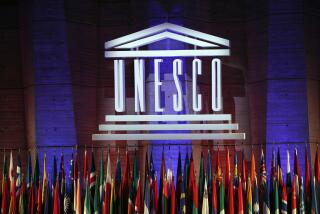Web Users Will Have a Say in ICANN Council
- Share via
Individual Internet users will be able to participate in the nonprofit organization charged with managing the Internet domain name system under a plan adopted Thursday.
Anyone with an e-mail account and a postal address will be able to vote for the 18 members of an “at-large council” that will become one of the main supporting organizations of the Los Angeles-based Internet Corp. for Assigned Names and Numbers, ICANN interim President Mike Roberts said.
Ten of the council members will be elected according to geographic region, with two each from North America, Latin America, Europe, Asia and Africa but no more than one from any single country. The eight remaining council members will be elected globally, Roberts said.
Once Internet voters elect the council, it will select nine people to represent Internet users on the ICANN board of directors.
Nine other members of the ICANN board will be selected by three other supporting organizations that focus on legal and technical issues regarding the domain name system and Internet protocols.
The Clinton administration has tapped ICANN to bring competition to the business of registering domain names, such as latimes.com. ICANN has approved scores of companies to register Internet addresses that end in .com, .net and .org.
No membership dues will be required to participate in the first round of elections. Instead, the group hopes to raise $100,000 from foundations and other private sources to fund the council’s start-up costs. Once the first council members have been elected, they will decide whether to collect dues or find other funding.
The first at-large elections could take place six to eight months from now, Roberts said.
The new blueprint for individual involvement, adopted at ICANN’s quarterly board meeting in Santiago, Chile, could mollify some ICANN critics who have complained that the interim board of directors has shown more concern for big corporations than for other Internet users.
ICANN staff members considered limiting the at-large membership to people who have registered domain names. The board was right to expand the membership to any Internet user who is interested in participating, said Jonathan Zittrain, executive director of the Berkman Center for Internet and Society at Harvard Law School. But he said the multilayer election system is “too Byzantine.”
To qualify for voting, Internet users will have to visit a Web site and fill out a form asking for “basic personal identifying information,” such as name and address but not a Social Security number, Roberts said. Those who sign up will receive a personal identification number, or PIN, in the regular postal mail. Then they will have to go back to the Web site and log in with their PIN to complete the registration process, which was designed to prevent voting fraud. Elections will not be held until at least 5,000 people from all over the world sign up, Roberts said.
The ICANN board also reaffirmed its commitment to devising a uniform set of rules for resolving alleged cases of cybersquatting, the practice of registering a domain name with the goal of selling it later at an inflated price. The board originally adopted a plan for resolving such disputes at its last meeting in Berlin, but it quickly came under fire from critics who said it gave too much power to trademark holders, which are mostly big corporations.
The vote in Santiago means an ICANN working group will have 45 days to write specific rules for resolving trademark disputes, Roberts said. The final rules will be very similar to the ones proposed in Berlin, but Roberts stressed that companies won’t be able to use them to wrest domain names away from individuals who registered them in good faith, with no intention of selling them later at a profit. When adopted, all domain name registrars will have to abide by them.







